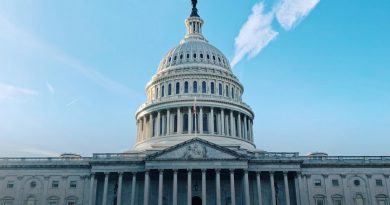You Can’t Turn Off Politics
A month ago, I attended a journalism conference that had journalist Lauren Duca as its closing speaker. In response to a question about covering different topics unrelated to politics, Duca responded with an affirmation: “You can’t not care about politics anymore.”
Hearing her vocalize a belief I’ve held for as long as I can remember hit me. I’ve followed politics as far back as the 2008 presidential election, one where I made the mindless decision to ask a priest who he voted for (he didn’t answer). Since then I’ve followed every race I can: local, state and federal. To me, it was important. To others, I realized soon after, it was boring.
That somewhat changed during the 2016 presidential cycle. Seeing the bombastic, pompous Donald J. Trump—the same Trump I grew up with, the one with the television show, the richest person I could think of—begin a campaign for president with wild, baseless statements on immigrants immediately made heads perk up and laugh.
However, as the cycle went on (and on, and on and still going), people around me began to realize the effects a Trump or Hillary Clinton presidency might have on their lives. Whether it was my Republican friends energized about ending Obama-era spending or Democratic friends angry about Trump’s xenophobic and misogynistic remarks, one thing stood out to me—people I knew were finally starting to care about politics. With protests following the election and the Women’s March after the inauguration, it felt confirmed.
But, that confirmation quickly subsided. Once it became apparent that the news would never end during the Trump administration, I noticed those same friends getting complacent. “There’s too much to keep up with,” they said. “It’s all too depressing.” I hated hearing it because I saw what happened when people cared about politics—they made their voices heard.
Political engagement isn’t something that can be turned off. The thing about politics is that when people look away, the lawmakers they put in charge are left unsupervised. That’s how we’re left with multiple efforts to repeal the Affordable Care Act or perpetual limbo with gun control and Deferred Action for Childhood Arrivals. It can be depressing, but a lot of things that affect our lives are. It’s the nature of the beast—one that can be tedious to tame.
That’s not to say that there isn’t any engagement. March for Our Lives, an organization founded by survivors of the Marjory Stoneman Douglas High School shooting, has made immense noise for its continued call for action against gun violence, and the necessity of voting. They use sing Twitter and Instagram to engage with their followers. On the conservative end, organizations like Turning Point USA engage with students on college campuses by helping them become more active through their political views. To his credit, President Trump is able to broaden his reach through his frequent tweets, letting people give more thought to his words even if their only exposure are his postings.
You can’t choose not to learn math or science in school simply because you don’t like it. The same should be true of politics, as it has the most chance of affecting your life.




